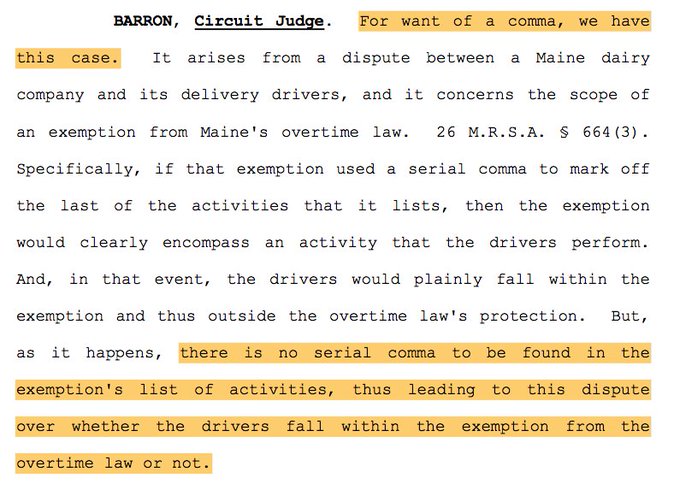A Missing Oxford Comma Decided This Ruling On Overtime Pay
“For want of a comma, we have this case.”
X
There’s not much that makes grammar and punctuation enthusiasts more hot and bothered than debates about Oxford commas. And a court ruling out of Maine is
adding fuel to the nerdy fire.
adding fuel to the nerdy fire.
On Monday, U.S. First Circuit Court of Appeals ruled in favor of a group of dairy
truck drivers who were suing Oakhurst Dairy for unpaid overtime wages,
the Bangor Daily News reports.
truck drivers who were suing Oakhurst Dairy for unpaid overtime wages,
the Bangor Daily News reports.
The judge’s reasoning that the drivers were in the right? The lack of an Oxford
comma in a list of activities deemed exempt from overtime pay.
comma in a list of activities deemed exempt from overtime pay.
“For want of a comma, we have this case,” Judge David Barron wrote in the
opening line of his decision.
opening line of his decision.
In case you need a refresher on what an Oxford comma is, it’s also known as
a “serial comma.” It’s the comma right after the next-to-last item in a list of three
or more things, before the words “and” or “or.”
a “serial comma.” It’s the comma right after the next-to-last item in a list of three
or more things, before the words “and” or “or.”
Oxford comma fans like to point to hilarious examples of how the lack of the
comma can cause confusion.
comma can cause confusion.
Even so, there are some powerful anti-Oxford comma forces out there —
notably, the AP Style Guide, which The Huffington Post follows. (Though
AP does specify that writers should insert the the comma when leaving it
out would cause misreading.)
notably, the AP Style Guide, which The Huffington Post follows. (Though
AP does specify that writers should insert the the comma when leaving it
out would cause misreading.)
So how does all of this play into the truck driver lawsuit? The Maine overtime
law in question states that workers must get overtime pay if they work more
than 40 hours a week, unless their work falls under an exemption. One of
these exemptions in state law reads as follows:
law in question states that workers must get overtime pay if they work more
than 40 hours a week, unless their work falls under an exemption. One of
these exemptions in state law reads as follows:
The canning, processing, preserving,
freezing, drying, marketing, storing,
packing for shipment or distribution of:
(1) Agricultural produce;
(2) Meat and fish products; and
(3) Perishable foods.
Oakhurst claimed that the phrase “packing for shipment or distribution”
covered workers who were packing goods for shipment, as well as workers
involved in “distribution” — like the truck drivers. But the truck drivers argued
that the phrase essentially meant “packing for shipment or packing for distribution.”
In other words, the distribution itself was a separate activity not covered by the exemption.
covered workers who were packing goods for shipment, as well as workers
involved in “distribution” — like the truck drivers. But the truck drivers argued
that the phrase essentially meant “packing for shipment or packing for distribution.”
In other words, the distribution itself was a separate activity not covered by the exemption.
If there had been a comma after “shipment,” the distinction would have been
more clear, and “distribution” would have been a more obviously distinct activity.
more clear, and “distribution” would have been a more obviously distinct activity.
Plus, there were other grammatical clues that “distribution” was not meant to
be read as a separate activity, the drivers noted. And Barron agreed.
be read as a separate activity, the drivers noted. And Barron agreed.
“The drivers read ‘shipment’ and ‘distribution’ each to be objects of the
preposition ‘for’ that describes the exempt activity of ‘packing,’” he wrote.
“And the drivers read the gerunds each to be referring to stand-alone,
exempt activities.”
preposition ‘for’ that describes the exempt activity of ‘packing,’” he wrote.
“And the drivers read the gerunds each to be referring to stand-alone,
exempt activities.”
Barron’s ruling reverses an earlier ruling by a U.S. District Court, which sided
with Oakhurst in saying that “distribution” was intended to be read as a
separate job responsibility. But according to the Bangor Daily News, there
will likely be more punctuation-heavy court proceedings before the case
is settled for good.
with Oakhurst in saying that “distribution” was intended to be read as a
separate job responsibility. But according to the Bangor Daily News, there
will likely be more punctuation-heavy court proceedings before the case
is settled for good.




No comments:
Post a Comment
Thanks for commenting. Your comments are needed for helping to improve the discussion.